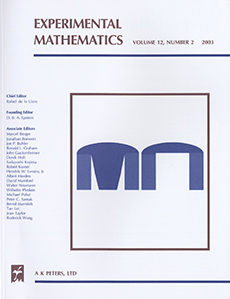Abstract
Any integer is expressible as a sum of two squares and a cube, mixed signs being allowed. We study the analogous question for a square and two cubes, and obtain an affirmative answer in the range from $-$4,000,000 to 2,000,000. For two squares and a cube with everything positive, computations support the possibility that there are only finitely many exceptions. However, $x^2 + y^2 + z^9$ admits infinitely many positive exceptions.
Citation
William C. Jagy. Irving Kaplansky. "Sums of squares, cubes, and higher powers." Experiment. Math. 4 (3) 169 - 173, 1995.
Information




